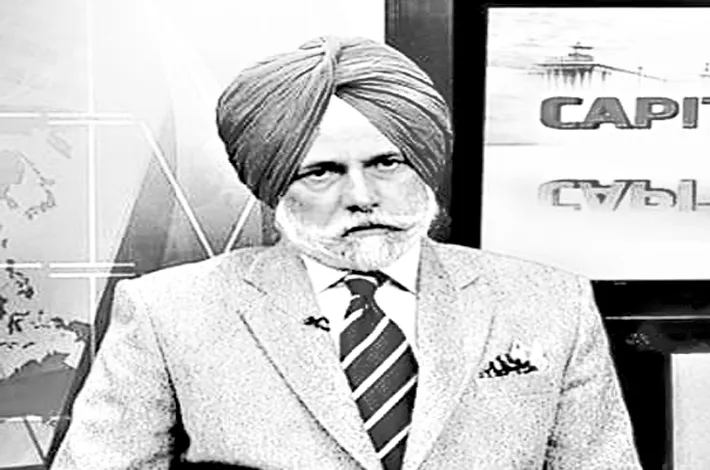Deal-making is Donald Trump’s one and only organising principle
13-03-2025 12:00:00 AM

Normally, the first 100 days of an elected leader demonstrate the direction of the new government. Trump took just 60 days.
The travails of war-entrenched Ukrainian president Volodymyr Zelenskyy exemplify it. Trump’s past isolationist rhetoric, including pressure on Republicans in Congress to stall military aid to Ukraine, indicated reluctance to support Ukraine. However, it was unimaginable that the US, under Trump, could instead assist the Russian war effort by weakening and demoralising Ukraine.
It began with the Oval Office altercation between Zelenskyy and Trump, the latter egged on by US vice president J.D. Vance. Some called it a US ambush, while others characterised it as Trump confronted with realistic arguments unlaced with flattery. French president Emmanuel Macron’s success in politely correcting Trump’s fact-free monologue while accepting the non-controversial portions was seen as ideal Trump-handling.
Ejected unceremoniously from the White House, without signing the rare earth and minerals agreement, Zelenskyy met European leaders in London. They convinced him to re-approach Trump, employing flattery and faux submission. His explanatory letter reached Washington on March 4, a day after the US halted weapons deliveries to Ukraine.
Instead of rewarding Ukrainian deference, the US, on March 5, stopped sharing battlefield intelligence, crucial to anticipating the Russian aerial attacks, weapons deployments and military manoeuvres. Thus, appeasement may or may not work when dealing with president Trump, if his primary goal is unachieved. While he boasts of deal-making in Ukraine, in reality he seeks Ukrainian surrender, mostly on Russian terms.
In any war, peace is possible by two means: one side accepting defeat or both reaching a point of exhaustion due to battlefield stalemate. Therefore, it defies common sense that if Trump desires a ceasefire, why weaken his supposed ally Ukraine without imposing any hardship on the Russians.
Similarly, in the case of the Gaza conflict, president Trump has adopted the agenda of Israel’s far-right, proposing that Gaza occupants be displaced on the pretext of rebuilding. Jordan and Egypt promptly rejected hosting the displaced Gaza civilians. Thereafter, the Arab League endorsed that stand. Now there is a counter-proposal from Arabs to finance and rebuild Gaza without forcibly shifting its residents.
Ukraine, too, has received almost unanimous support from European nations. The reliability of US support has always faced scepticism amongst the European NATO members. The withdrawal of France from that alliance, and then rejoining after the Cold War, was the brainchild of iconic French leader Charles de Gaulle. This approach, named after him as Gaullism, was distinguished from Atlanticism, which saw Canada and the US as vital parts of NATO.
Trump has not only revived that debate but forced Europe to prepare for a possible US exit from NATO. French president E. Macron and newly-elected German chancellor Friedrich Merz are leading proponents of Europeans becoming self-sufficient in defending themselves. The latter, formerly an Atlanticist, proposes making Europe achieve “independence from the USA.”
Canadian politics also has been impacted by Trump’s provocative remarks about making Canada the 51st state of the US, besides imposing tariffs on Canadian goods. By bravely confronting Trump, the outgoing Canadian prime minister Justin Trudeau found his floundering popularity restored. His liberal party, expected to be ousted in the next election by the conservatives, has also regained support.
It has elected former central bank governor and investor Mark Carney as the new leader, who announced that “America is not Canada. And Canada never, ever will be part of America in any way, shape or form.” He added that his conservative party opponent Pierre Poilievre shall never lead Canada, as he “worships at the altar of Donald Trump.”
China, too, has circled its waggons to defend against Trump’s disruptive tariff plan. On March 5, when president Trump delivered his State of the Union address to the US Congress, the Chinese prime minister, Li Qiang, also submitted his annual report to China’s National People’s Congress. The Chinese foreign ministry proclaimed that “if war is what the US wants... we are ready to fight till the end.”
In 1985, US president Ronald Reagan, in his State of the Union address, said the US mission was “to nourish and defend freedom and democracy and to communicate these ideals everywhere.” Trump is wandering away from these post-1945 models and ideals. The Economist magazine calls his new approach “deal-making as an organising principle.” In this race, territory, technology, minerals and more are up for grabs. The French president warns that “we are entering a new era.”
India, so far, has chosen to appease Trump and avoid contradicting even blatant lies about Indian tariffs. India is working hard to lower tariffs without distorting its trade with the rest of the world. The danger of secrecy is that Trump can act or speak without discretion or notice and embarrass India.
The Economist again cautions that with Trump, “dependence leads to maltreatment.” After almost eight decades of strategic independence, what appears like kowtowing can have domestic political repercussions. Thus, until the first week of April, when US tariffs on Indian exports kick in, Indian diplomacy has limited time to satisfy Trump, who claims that “My whole life is deals.” Simultaneously, the world has fingers crossed.








